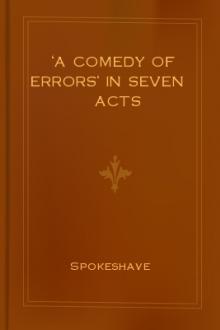Tales of St. Austin's by P. G. Wodehouse (debian ebook reader TXT) 📗

- Author: P. G. Wodehouse
Book online «Tales of St. Austin's by P. G. Wodehouse (debian ebook reader TXT) 📗». Author P. G. Wodehouse
'No human being has done this horrid thing,' said Montgomery. He always liked to introduce a Holmes-Watsonian touch into the conversation. 'In the first place, the door was locked, wasn't it, Smith?'
'By Jove, so it was. Then how on earth—?'
'Through the window, of course. The cat, equally of course. I should like a private word with that cat.'
'I suppose it must have been.'
'Of course it was. Apart from the merely circumstantial evidence, which is strong enough to hang it off its own bat, we have absolute proof of its guilt. Just cast your eye over that butter. You follow me, Watson?'
The butter was submitted to inspection. In the very centre of it there was a footprint.
'I traced his little footprints in the butter,' said Montgomery. 'Now, is that the mark of a human foot?'
The jury brought in a unanimous verdict of guilty against the missing animal, and over a sorrowful cup of tea, eked out with bread and jam—butter appeared to be unpopular—discussed the matter in all its bearings. The cat had not been an inmate of Prater's House for a very long time, and up till now what depredation it had committed had been confined to the official larder. Now, however, it had evidently got its hand in, and was about to commence operations upon a more extensive scale. The Tabby Terror had begun. Where would it end? The general opinion was that something would have to be done about it. No one seemed to know exactly what to do. Montgomery spoke darkly of bricks, bits of string, and horse-ponds. Smith rolled the word 'rat-poison' luxuriously round his tongue. Shawyer, who was something of an expert on the range, babbled of air-guns.
At tea on the following evening the first really serious engagement of the campaign took place. The cat strolled into the tea-room in the patronizing way characteristic of his kind, but was heavily shelled with lump-sugar, and beat a rapid retreat. That was the signal for the outbreak of serious hostilities. From that moment its paw was against every man, and the tale of the things it stole is too terrible to relate in detail. It scored all along the line. Like Death in the poem, it knocked at the doors of the highest and the lowest alike. Or rather, it did not exactly knock. It came in without knocking. The palace of the prefect and the hovel of the fag suffered equally. Trentham, the head of the House, lost sausages to an incredible amount one evening, and the next day Ripton, of the Lower Third, was robbed of his one ewe lamb in the shape of half a tin of anchovy paste. Panic reigned.
It was after this matter of the sausages that a luminous idea occurred to Trentham. He had been laid up with a slight football accident, and his family, reading between the lines of his written statement that he 'had got crocked at footer, nothing much, only (rather a nuisance) might do him out of the House-matches', a notification of mortal injuries, and seeming to hear a death-rattle through the words 'felt rather chippy yesterday', had come down en masse to investigate. En masse, that is to say, with the exception of his father, who said he was too busy, but felt sure it was nothing serious. ('Why, when I was a boy, my dear, I used to think nothing of an occasional tumble. There's nothing the matter with Dick. Why, etc., etc.')
Trentham's sister was his first visitor.
'I say,' said he, when he had satisfied her on the subject of his health, 'would you like to do me a good turn?'
She intimated that she would be delighted, and asked for details.
'Buy the beak's cat,' hissed Trentham, in a hoarse whisper.
'Dick, it was your leg that you hurt, wasn't it? Not—not your head?' she replied. 'I mean—'
'No, I really mean it. Why can't you? It's a perfectly simple thing to do.'
'But what is a beak? And why should I buy its cat?'
'A beak's a master. Surely you know that. You see, Prater's got a cat lately, and the beast strolls in and raids the studies. Got round over half a pound of prime sausages in here the other night, and he's always bagging things everywhere. You'd be doing everyone a kindness if you would take him on. He'll get lynched some day if you don't. Besides, you want a cat for your new house, surely. Keep down the mice, and that sort of thing, you know. This animal's a demon for mice.' This was a telling argument. Trentham's sister had lately been married, and she certainly had had some idea of investing in a cat to adorn her home. 'As for beetles,' continued the invalid, pushing home his advantage, 'they simply daren't come out of their lairs for fear of him.'
'If he eats beetles,' objected his sister, 'he can't have a very good coat.'
'He doesn't eat them. Just squashes them, you know, like a policeman. He's a decent enough beast as far as looks go.'
'But if he steals things—'
'No, don't you see, he only does that here, because the Praters don't interfere with him and don't let us do anything to him. He won't try that sort of thing on with you. If he does, get somebody to hit him over the head with a boot-jack or something. He'll soon drop it then. You might as well, you know. The House'll simply black your boots if you do.'
'But would Mr Prater let me have the cat?'
'Try him, anyhow. Pitch it fairly warm, you know. Only cat you ever loved, and that sort of thing.'
'Very well. I'll try.'
'Thanks, awfully. And, I say, you might just look in here on your way out and report.'
Mrs James Williamson, nee Miss Trentham, made her way dutifully to the Merevale's part of the House. Mrs Prater had expressed a hope that she would have some tea before catching her train. With tea it is usual to have milk, and with milk it is usual, if there is a cat in the house, to have feline society. Captain Kettle, which was the name thought suitable to this cat by his godfathers and godmothers, was on hand early. As he stood there pawing the mat impatiently, and mewing in a minor key, Mrs Williamson felt that here was the cat for her. He certainly was good to look upon. His black heart was hidden by a sleek coat of tabby fur, which rendered stroking a luxury. His scheming brain was out of sight in a shapely head.
'Oh, what a lovely cat!' said Mrs Williamson.
'Yes, isn't he,' agreed Mrs Prater. 'We are very proud of him.'
'Such a beautiful coat!'
'And such a sweet purr!'
'He looks so intelligent. Has he any tricks?'
Had he any tricks! Why, Mrs Williamson, he could do everything except speak. Captain Kettle, you bad boy, come here and die for your country. Puss, puss.





Comments (0)